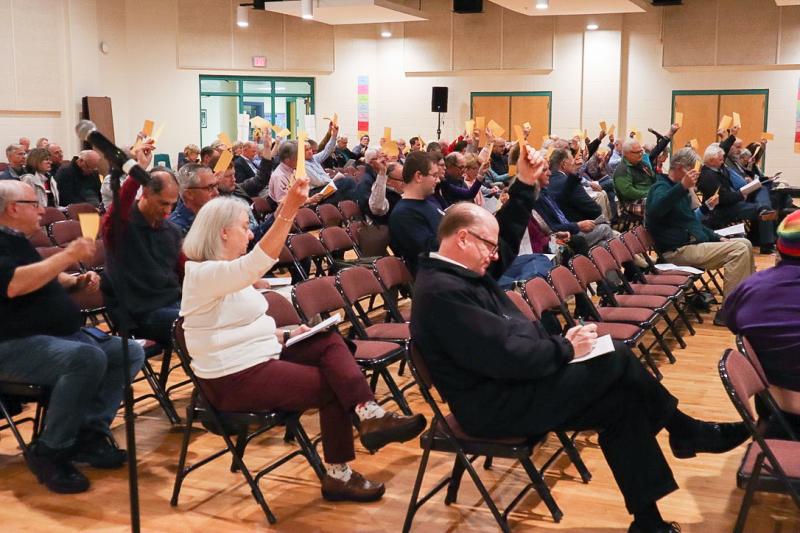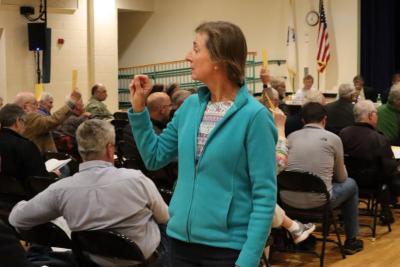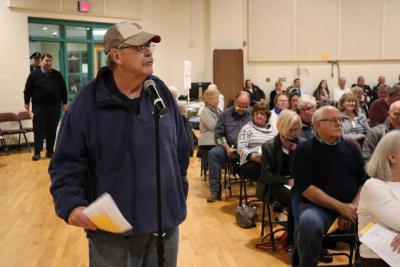Voters OK negotiations, designs, fees at Marion Town Meeting
MARION — Town Meeting on Oct. 21 approved funding for designs and studies for town facilities, equipment for the Fire Department, taxes and fees on short-term rentals, and negotiations for leaving the Carver Marion Wareham Regional Refuse District.
Perhaps the most controversial portion of the Town Meeting was a series of three articles involving taxes and fees on short-term rentals, such as those offered through Airbnb. The first imposed a local excise tax of 6% on the transfer of rooms in hotels, motels, and “bed and breakfast establishment[s].” The second imposed a 3% community impact fee on each transfer of occupancy for professionally managed units based on the total rent price. The third imposed the same fee for two- and three- family dwellings.
People who rent out properties for 14 days, or less per year will not be affected by the tax.
The first article accepted a state tax, and the others approved community fees that will be added on to the existing state tax.
Some residents complained that these measures would “reduce rentability” in the town. One resident said that short-term rentals were valuable to the town as a way to make money or welcome visiting family members and went as far as saying that one of the articles was “attacking a system that has worked very well.”
Despite the controversy, these articles were approved by votes of 76 to 32, 57 to 48, and 63 to 43 respectively.
After the meeting, McGrail clarified that the renters would be paying the fees, as opposed to property owners.
Voters approved $25,000 to study a new Harbormaster building. The current facility is small and not handicap accessible.
The town’s selectmen explained the study is needed to qualify for for a grant from the Seaport Economic Council, and that other towns in the state have received grants of over $1 million for Harbormaster facilities, if they have some educational component.
Selectman John Waterman said that the new building at Island Wharf Road would likely have a classroom space, to fit this requirement.
Selectmen also said that the $25,000 was for the study only, and that construction would not be done, unless the project could be paid for by grants.
Despite some concerns about the cost, voters also approved transferring $30,400 from the Capital Stabilization Fund for the design of an emergency access driveway connecting Sippican School to Route 6.
Selectmen explained that a previous incident where a transformer pole fire on Park Street forced buses to drive over a curb and across the Town House lawn to evacuate school grounds, served as a “wake up call” that having only one way out from the back of the school would not be enough.
Some residents commented that the sum was a lot of money for a study, and questioned whether there were any other incidents that warranted the expense.
Selectmen responded that the transformer pole fire was the only incident, but the project would be beneficial, even if only used very occasionally.
Town Administrator James McGrail said that the construction would cost $200,000 to $300,000 and would likely come before voters again in May.
After clarification from the selectmen and town administrator, voters authorized McGrail to begin negotiations to leave the Carver Marion Wareham Regional Refuse District.
The district was formed in the 1970s to secure free waste disposal for members at the SEMASS waste-to-energy plant in Rochester, while SEMASS could use the Carver landfill to dispose of its ash for free.The agreement will end at the end of 2020.
The vote would allow exit negotiations, but once the terms of leaving the contract have been negotiated, a second Town Meeting vote will need to approve those terms, before Marion leaves the district.
One article for the Fire Department approved $44,573 towards the purchase of a new fire tanker truck and training for firefighters to use the truck, for which the town has already received a grant of $297,142.85.
In an informational meeting on Wednesday Oct. 17, Fire Chief Brian Jackvony explained that the tanker could provide a quick first response in areas that may otherwise not be prepared to handle an emergency due to poor water flow in hydrants on private property.














